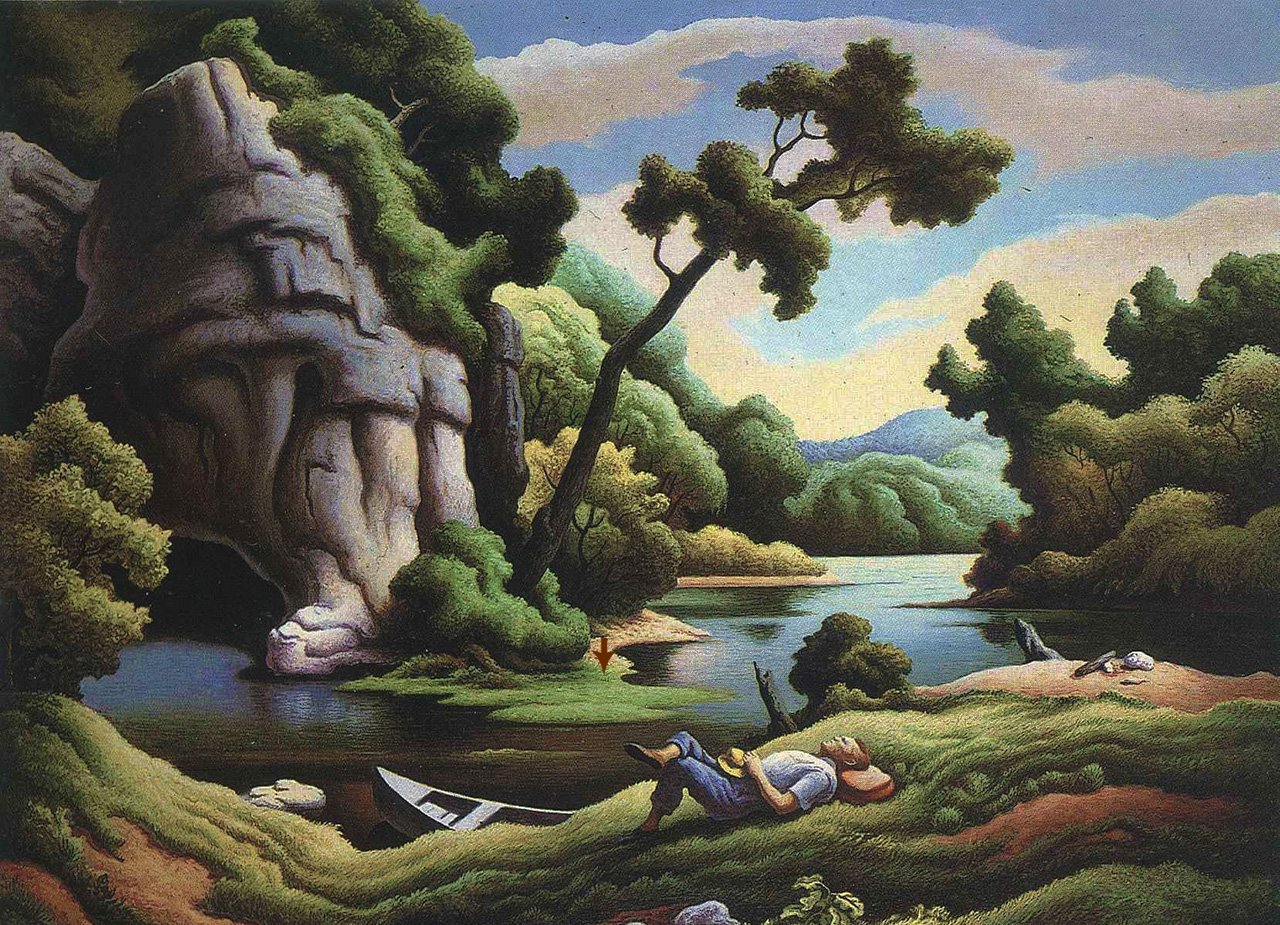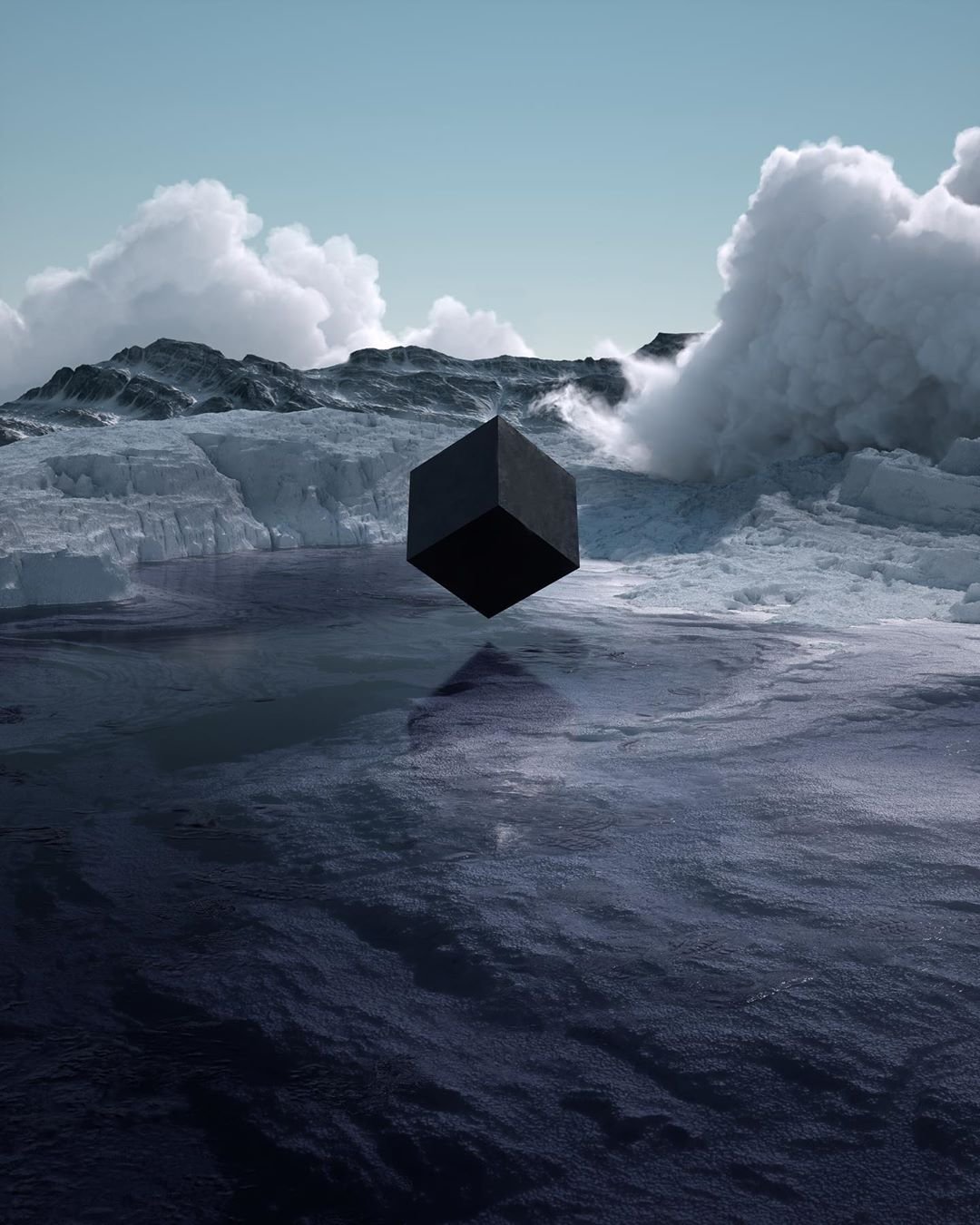
ESSAYS
Thomas Hart Benton, Cave Spring

Interbreathing Ecocultural Identity in the Humilocene: A Conversation
Abram: So often our internecine human conflicts – our readiness to take offense at perceived slights in relation to some identity or other – come in the way of and interrupt any felt discovery of our shared dependence upon the Earth, our shared interdependence with other creatures and plants and earthly elements. I often think that we use identity conflicts to hide, or avoid noticing, what’s really at stake today – which is our deeper identity as parts of Earth. There’s been so much violence toward or between or against particular groups, violations and affronts, marginalizations and erasures that must indeed be recognized, acknowledged, and – to whatever extent possible – accounted for, apologized for, even atoned for. But we do not have time for all of these affronts in their specificity to be recognized clearly before we begin noticing the collective assault – to which most if not all of us contribute – on the biosphere itself, the collective desecration of our larger Body.

Psyche and the Ecological Crisis: Dave Abram at the C. G. Jung Institute
Patricia Damery: It is a pleasure to have you with us, David, and particularly on this topic of the environment and psyche. The environmental crisis is certainly registering in the collective. The last couple of months in the San Francisco area have been very dry, as well as too warm and then too cold. It used to be that we would think this was a normal variation, but now you can feel the often unspoken question: is this a part of some larger climate change for which we are ill-prepared? Since the science is addressed elsewhere, tonight we will talk about the impact of what’s happening in the environment on all of us. I think that the environmental crisis is really a crisis of consciousness. We want to talk about what that might be, and what we might do.

Coming To Our (Animal) Senses: A conversation between David Abram and Dougald Hine
In the opening pages of The Spell of the Sensuous, David Abram stands in the night outside his hut in Bali, the stars spread across the sky, mirrored from below in the water of the rice paddies, and countless fireflies dancing in between. This disorientating abundance of wonder is close to what many of his readers have felt on encountering Abram’s words and his way of making sense of the world.

The Boundary Keeper: Dialogue with editor-in-chief of Shambhala Sun
Jeremy Hayward: Maybe we could begin by talking a little bit about animism. It seems to me that the main thing you are trying to communicate in The Spell of the Sensuous is a sense that the world is not made of dead matter—that there’s actually abundant life and intelligence everywhere.
David Abram: One of the strong intentions that moves through the book is the hope of breaking down what I see as a very artificial boundary between that which is animate and that which is inanimate, or between that which is alive and that which is not.
I very much want to suggest that everything is animate, that all things have their dynamism, that everything moves. It’s just that some things move much more slowly than other things, so we don’t notice their movement as readily. Suppose I’m walking along and a beautiful rockface draws my attention—I have a particular cliff in mind as I’m saying this— and I find myself moved by this presence, by this rock, by this huge implacable force that captures me each time I walk near it. If I’m moved by this being, how can I say that it does not move? By insisting that the rock itself does not move I’m denying my own direct experience.

All Knowledge is Carnal Knowledge: A Correspondence
David Abram: Hi, David! Here I am at last. My sweetheart and I have been wandering through the American West, snooping around for a potential community, and although no place reached up through our feet and grabbed us, we’ve landed for a time in the high desert of northern New Mexico—in the midst of a mongrel community of activists I know fairly well from years spent living and loving in this dusty terrain before moving to Washington State three years ago. We had hoped that island realm would claim us, but the combined effects of Boeing, Microsoft, and the city of Seattle generally sprawling all around us, sprawling up into our noses and our ears, finally forced us to flee. We embarked on this most futile of quests in turn-of-the-millennium America: the quest for wildness—wildland and wild, earthy, close to the ground community. Slim pickin’s these days. Development everywhere, clearcuts even in the back of the backcountry, streams ravaged by effluent from abandoned mining operations. It’s not all hopeless: there’s still plenty mystery out in them thar hills, but I was mostly shocked by how the same all the towns are becoming. Ah well . . . I suppose Canada’s a decade or two behind the States, and if only we could get visas to live and work in Canada, we prob’ly be there in a flash.

David Abram interviewed by Derrick Jensen
Derrick Jensen: I’d like to start with two questions that might actually be one. They are: Is the natural world alive? And second, what is magic?
David Abram: Is there really anything that is not alive? Certainly we are alive, and if we assume that the natural world is in some sense not alive, it can only be because we think we’re not fully in it, and of it.
Actually, it’s difficult for me to conclude that any phenomenon I perceive is utterly inert and lifeless; or even to imagine anything that is not in some sense alive, that does not have its own spontaneity, its own openness, its own creativity, its own interior animation, its own pulse — although in the case of the ground, or this rock right here, its pulse may move a lot slower than yours or mine.
Now your other question: What is magic? In the deepest sense, magic is an experience. It’s the experience of finding oneself alive within a world that is itself alive. It is the experience of contact and communication between oneself and something that is profoundly different from oneself: a swallow, a frog, a spider weaving its web…




